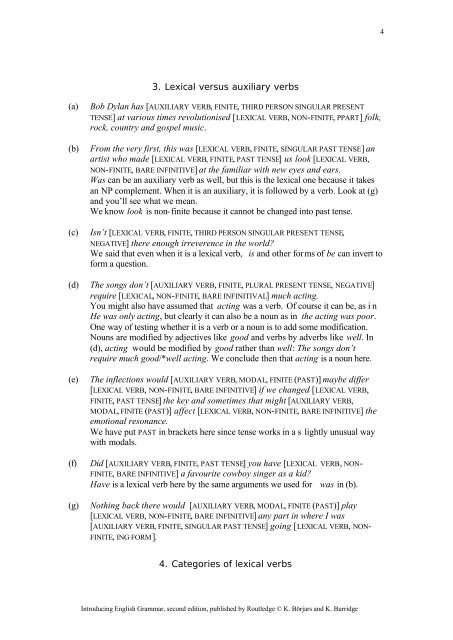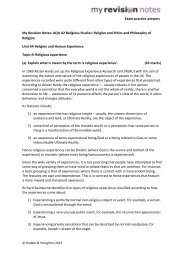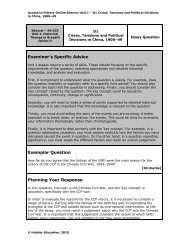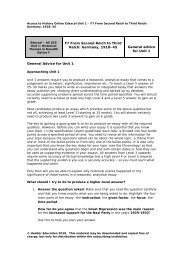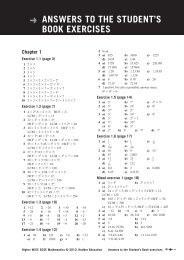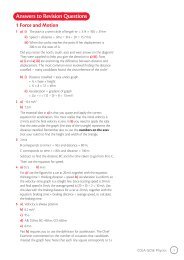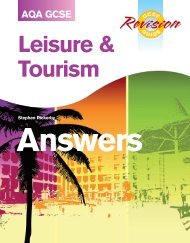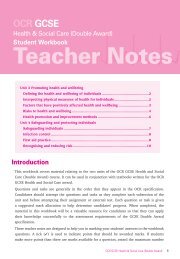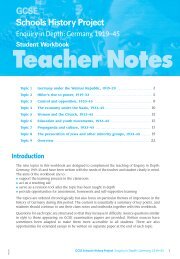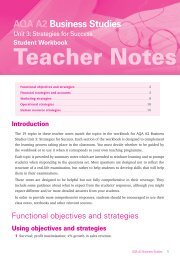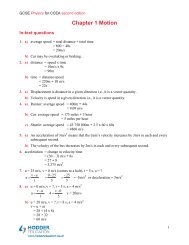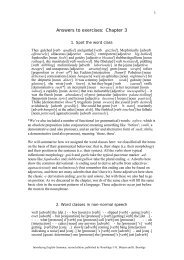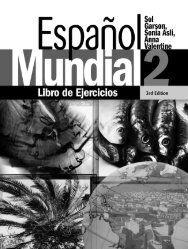Create successful ePaper yourself
Turn your PDF publications into a flip-book with our unique Google optimized e-Paper software.
43. Lexical versus auxiliary verbs(a)(b)(c)(d)(e)(f)(g)Bob Dylan has [AUXILIARY VERB, FINITE, THIRD PERSON SINGULAR PRESENTTENSE] at various times revolutionised [LEXICAL VERB, NON-FINITE, PPART] folk,rock, country and gospel music.From the very first, this was [LEXICAL VERB, FINITE, SINGULAR PAST TENSE] anartist who made [LEXICAL VERB, FINITE, PAST TENSE] us look [LEXICAL VERB,NON-FINITE, BARE INFINITIVE] at the familiar with new eyes and ears.Was can be an auxiliary verb as well, but this is the lexical one because it takesan NP complement. When it is an auxiliary, it is followed by a verb. Look at (g)and you’ll see what we mean.We know look is non-finite because it cannot be changed in<strong>to</strong> past tense.Isn’t [LEXICAL VERB, FINITE, THIRD PERSON SINGULAR PRESENT TENSE,NEGATIVE] there enough irreverence in the world?We said that even when it is a lexical verb, is and other forms of be can invert <strong>to</strong>form a question.The songs don’t [AUXILIARY VERB, FINITE, PLURAL PRESENT TENSE, NEGATIVE]require [LEXICAL, NON-FINITE, BARE INFINITIVAL] much acting.You might also have assumed that acting was a verb. Of course it can be, as i nHe was only acting, but clearly it can also be a noun as in the acting was poor.One way of testing whether it is a verb or a noun is <strong>to</strong> add some modification.Nouns are modified by adjectives like good and verbs by adverbs like well. In(d), acting would be modified by good rather than well: The songs don’trequire much good/*well acting. We conclude then that acting is a noun here.The inflections would [AUXILIARY VERB, MODAL, FINITE (PAST)] maybe differ[LEXICAL VERB, NON-FINITE, BARE INFINITIVE] if we changed [LEXICAL VERB,FINITE, PAST TENSE] the key and sometimes that might [AUXILIARY VERB,MODAL, FINITE (PAST)] affect [LEXICAL VERB, NON-FINITE, BARE INFINITIVE] theemotional resonance.We have put PAST in brackets here since tense works in a s lightly unusual waywith modals.Did [AUXILIARY VERB, FINITE, PAST TENSE] you have [LEXICAL VERB, NON-FINITE, BARE INFINITIVE] a favourite cowboy singer as a kid?Have is a lexical verb here by the same arguments we used for was in (b).Nothing back there would [AUXILIARY VERB, MODAL, FINITE (PAST)] play[LEXICAL VERB, NON-FINITE, BARE INFINITIVE] any part in where I was[AUXILIARY VERB, FINITE, SINGULAR PAST TENSE] going [LEXICAL VERB, NON-FINITE, ING FORM].4. Categories of lexical verbsIntroducing English Grammar, second edition, published by Routledge © K. Börjars and K. Burridge


